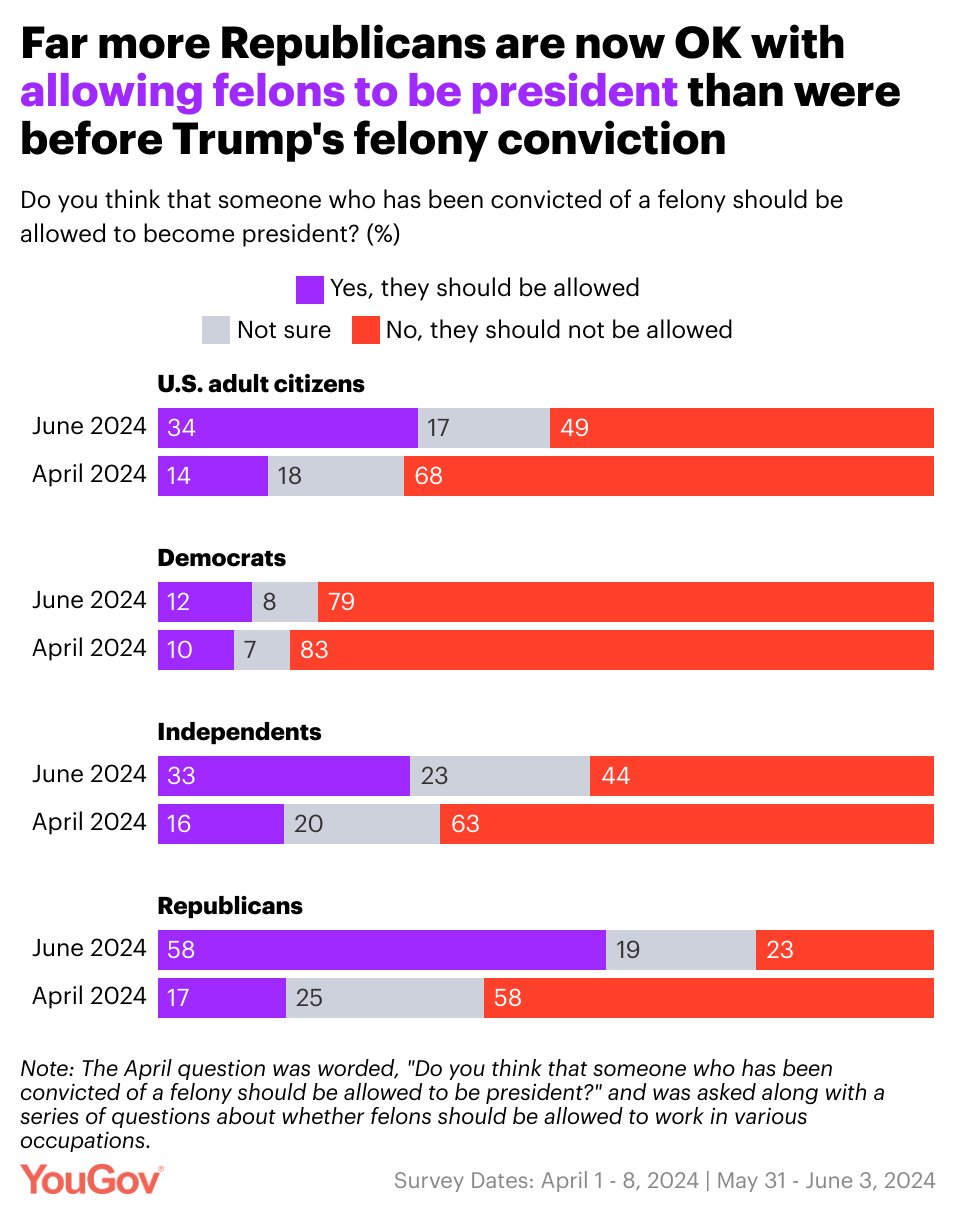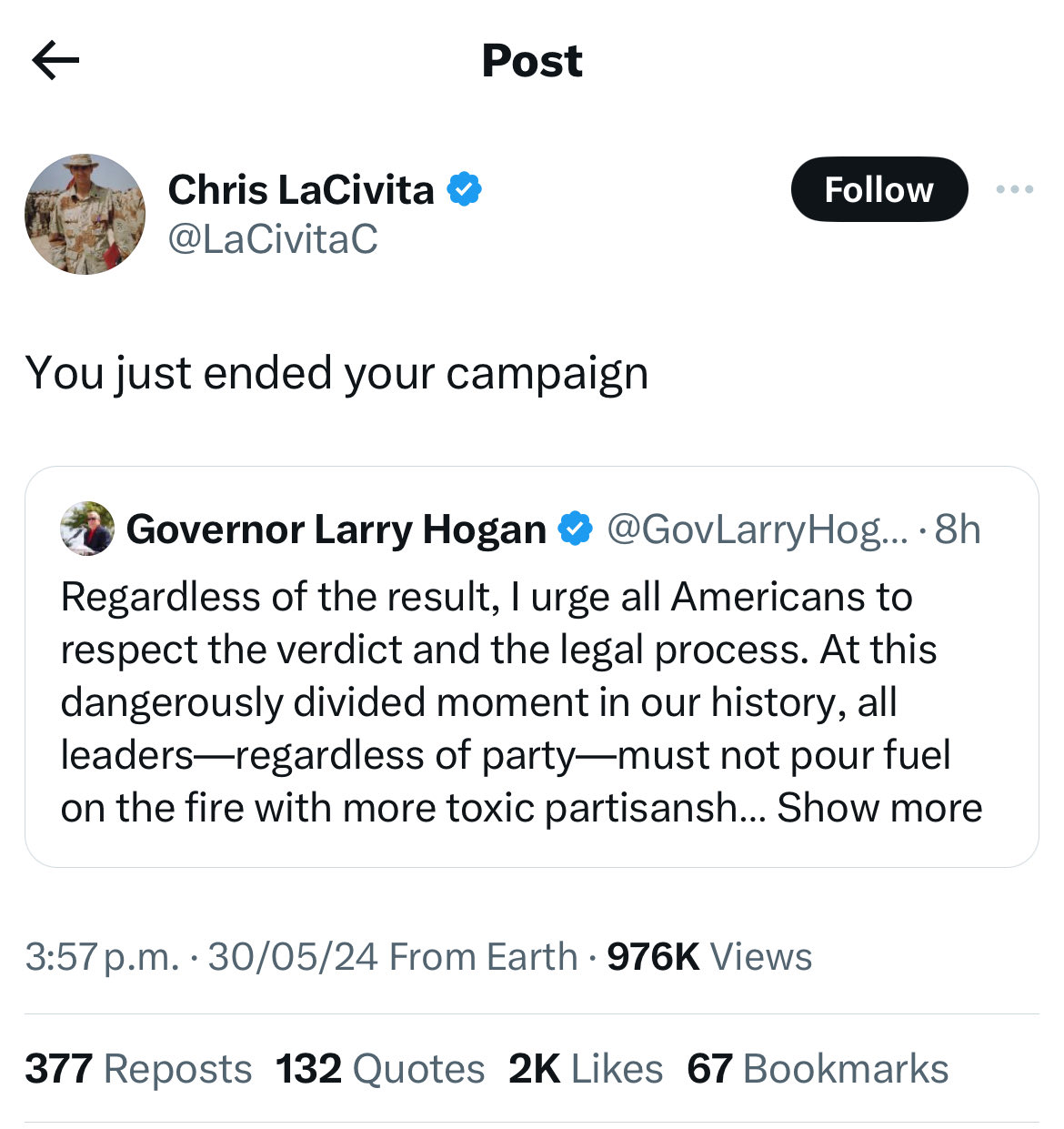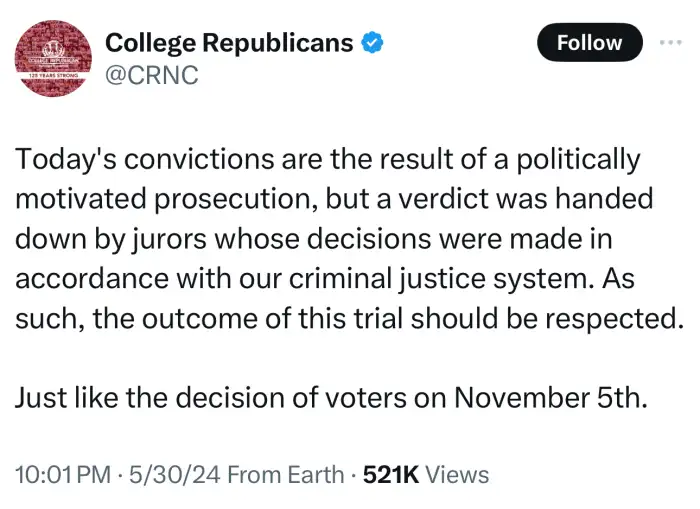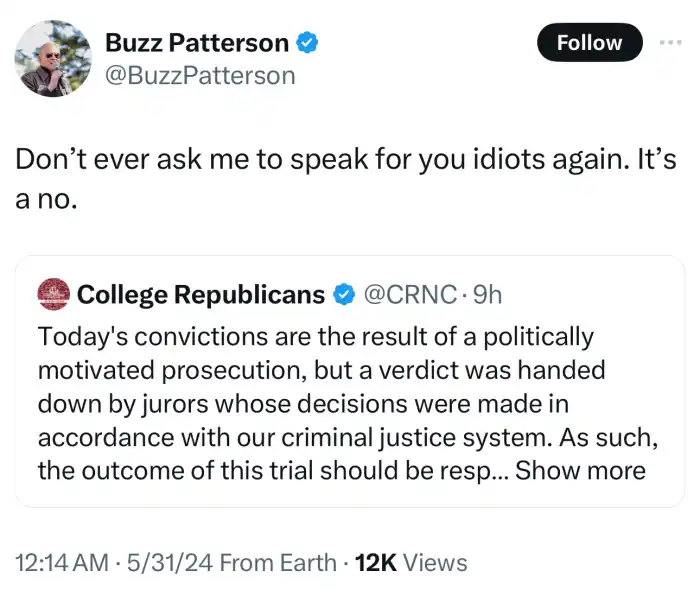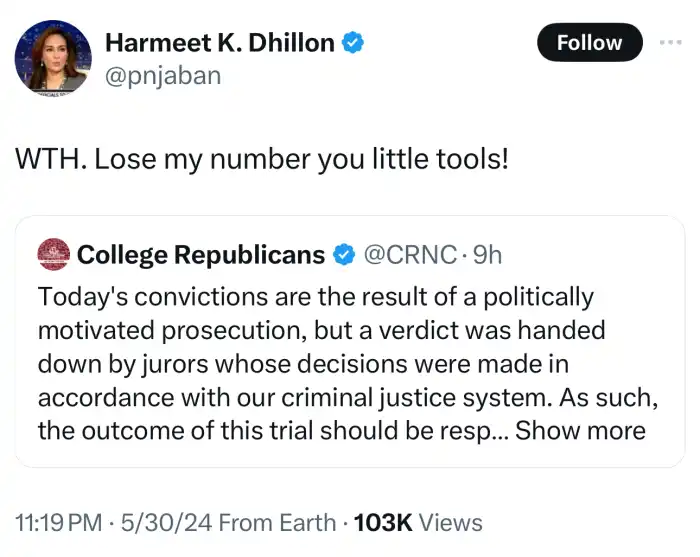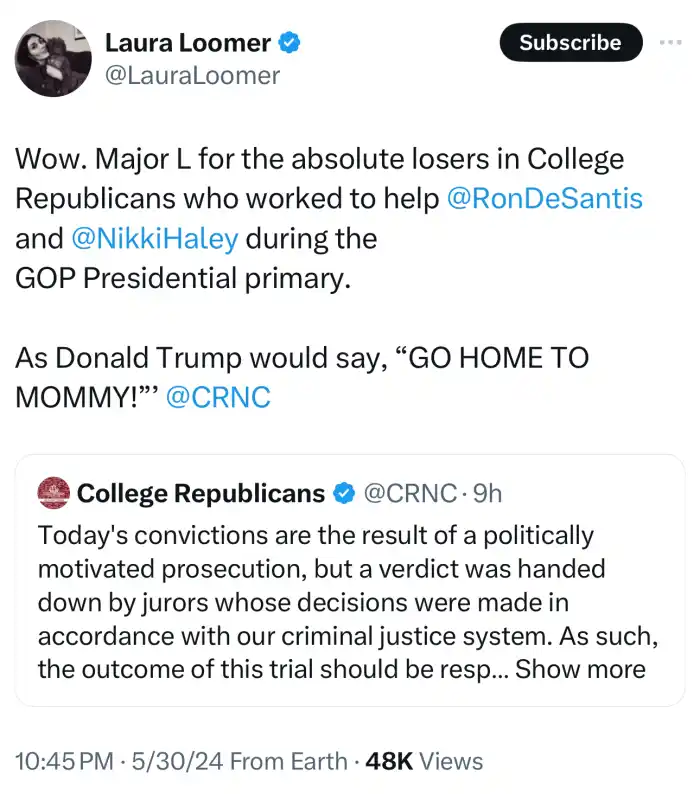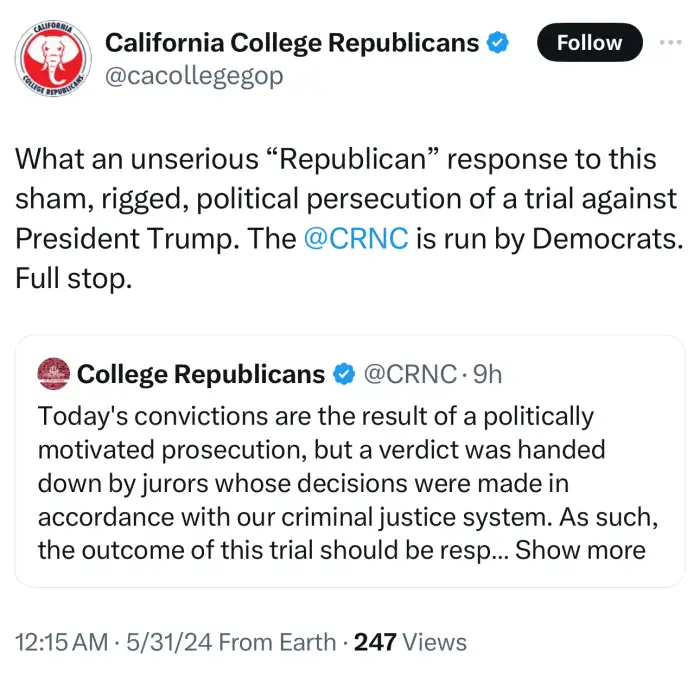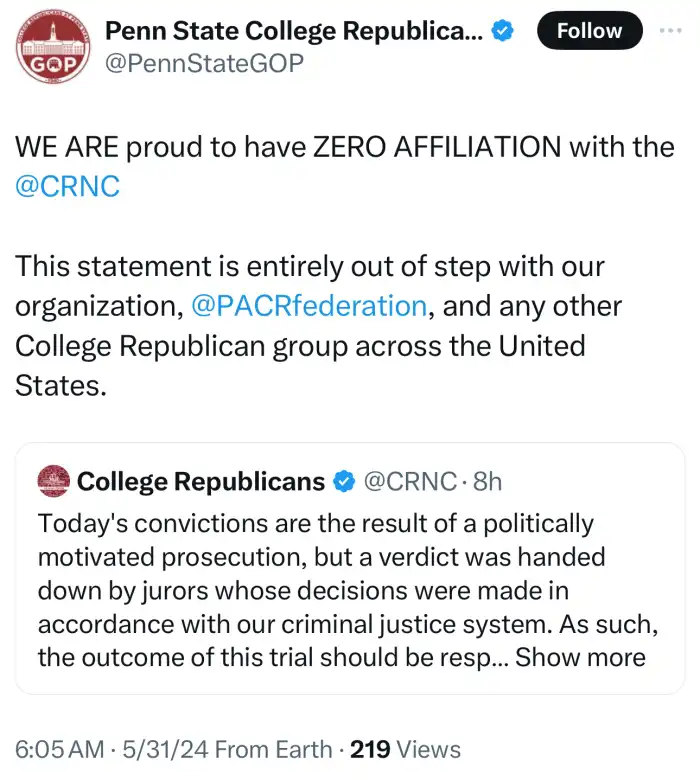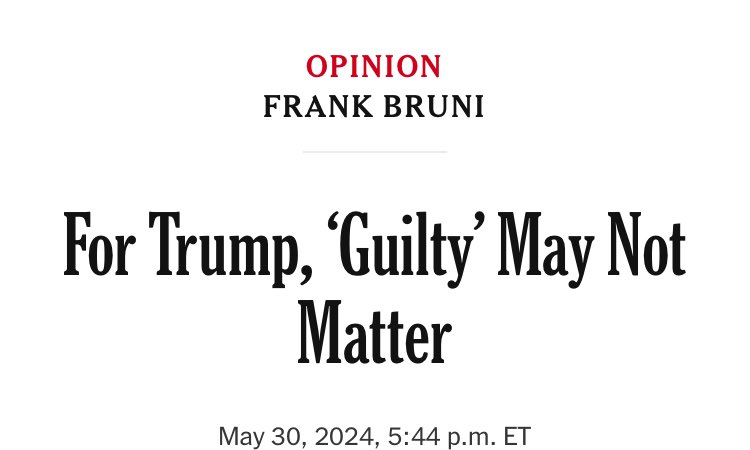From Andrew Gelman:
"How would the election turn out if Biden or Trump were replaced by a different candidate?"
The piece is definitely worth reading, informative and well argued, but the problem is Gelman never actually discusses replacing either Biden or Trump. Admittedly, the passive voice does buy a little wiggle room, but not enough. Even if we assume the replacement has already occurred, the event itself would radically change the landscape. You can't simply plug another candidate in for either of these two men and make it anything more than an alternate history thought experiment.
More to the point, that's not what this conversation has been about up to this point. We have had prominent political commentators such as Nate Silver and Ezra Klein seriously proposing that an incumbent president having already easily cinched renomination, should withdraw from the race taking his vice president and heir apparent with him. What's more, these commentators have presented this as obviously the Democrats' best chance at holding on to the White House and preventing a disastrous second term for Trump.
In any comparison there are two quantities of interest, in this case, the probability of Joe Biden winning if he, more or less, continues doing what he's doing, compared to the chances of the Democrats winning if they make this desperate and unprecedented move. Let's look at that second number.
Josh Marshall and Scott Lemieux among others have already pointed out numerous holes in the arguments for what Marshall calls ThunderDome primaries, but while we are here let's do a quick run through. Though Klein and the rest have framed their arguments as data-based, they never really get past the level of underwear gnome plans and headless clown analogies. There's really no way they could. What's being suggested here is unprecedented, and to the extent there are partial precedents of shaking up the ticket, contesting primaries for incumbents, ThunderDome primaries, or trying big Hail Marys when running badly behind, they pretty much all undercut the argument.
Starting in 1952 (which is about as far back as we can safely go when looking for historical precedents) we have an interesting non-example where there was a great deal of pressure to dump Nixon. Eisenhower chose the calm and steady path and though we can debate as to whether or not the end result was good for the country, it does not appear to have hurt the party either then or in 1956.
In 1972, we have a twofer, a ThunderDome primary and a shakeup of the ticket. Though the Democrats' fate was probably sealed going into the election, I don't think anyone would argue these things help their chances.
In 1980, we have Ted Kennedy challenging the incumbent in the primaries. Once again, while it probably wouldn't have affected the outcome, it certainly didn't help
In 2008, John McCain tried to catch up with Obama with a big Hail Mary pass. He shocked pretty much everyone by choosing an unconventional and largely unknown but genuinely charismatic running mate who also shored up his support in the evangelical base. In many ways, Sarah Palin looked wonderful on paper, but few would now claim this was the senator's smartest move.
I skipped 1968 to save the best for last. This is the only time in living memory when an incumbent chose to step down, and this may be the only election on this list where we probably can draw some lessons, particularly if we remove RFK from the scenario. (While there is an RFK in this race, there is no one analogous to RFK, no big name obvious front runner waiting in the wings.) Ironically but unsurprisingly, based on polling I've seen of Democrats about the 2028 election, the candidate with the most support and name recognition is Harris, whom the meta-panic crowd also wants to dump.
Another really troubling parallel between then and now is a highly divisive antiwar movement, and as much damage as the Democrats saw in 1968, 2024 would have the potential to play out even worse. As angry as the pro-Palestinian faction may be, when you take out the Jill Stein voters and the heightened the contradictions leftists (sizable overlap there) who were unlikely to actually show up for Biden in November anyway, the sane faction who remain has a strong incentive to vote a straight Democratic ticket on election day. For all their threats, they know that a Trump presidency would make conditions far worse in Gaza.
In a ThunderDome convention, this anti-war contingent would have tremendous leverage and every incentive to demand costly concessions from the eventual candidate. According to the polling I've seen, most people are somewhere in the middle on this issue, appalled by both the terrorist attacks and the humanitarian crisis in Gaza. For all its controversy, Biden had staked out the popular position. That wouldn't be an option without an incumbent as the nominee. Expect similar battles over issues like abortion. At the moment, the Democrats have an incredibly popular message in large part because Biden doesn't have to go into specifics beyond restoring Roe V Wade. We are sitting on the global maximum. Any move is a move down.
Other than being younger, the candidate who would emerge from this process would still have all of Biden's other weaknesses. Just as Hubert Humphrey inherited Vietnam, any Democrat running in 2024 will inherit the perceptions of a bad economy and the turmoil in the Middle East. Given the names currently being floated, they will be largely unknown and unvetted (or worse), trying to unite a party consisting of people who recently chose someone else in a bitter primary.
The chances of this producing a winning candidate are small at best, but what matters here is relative size. If Joe Biden's situation was looking like Mondale in September, it still probably wouldn't be worth the risk but at least you could make an argument.
What do the models tell us about Biden's chances at the moment?
Even if we go with the far less optimistic economist forecast, Biden is still at one out of four, hardly where we would like to be, but nowhere near the 1% or 2% level needed to justify the ThunderDome.
Of course, this whole conversation is beyond silly. None of this ever had the slightest chance of actually happening. What's important here is not the proposals themselves, but the fact that serious people (or at least people we treat as serious) made these suggestions and that they got so much traction.
Comments, observations and thoughts from two bloggers on applied statistics, higher education and epidemiology. Joseph is an associate professor. Mark is a professional statistician and former math teacher.
Tuesday, June 18, 2024
538 + 1968 does not add up to meta-panic
Monday, June 17, 2024
Summer in Texas means it's time for a ground source heat pump repost
Happily, both of the nuclear units that were out of commission are back online producing 5,000 megawatts. Unhappily, there are still nearly 18,000 megawatts of coal and gas plants offline as this climate change-fueled heat wave sets in. #txclimate #txenergy pic.twitter.com/0XgsO1MjCS
— Doug Lewin (@douglewinenergy) May 25, 2024
Put in XKCD terms, if you're trying to heat your house on a very cold day (or, reversing the process, cool it on a very hot day), you're going to have to squeeze really hard, which is going to put additional strain on the grid, but as far as your ground source system is concerned, the days are never very hot or cold. It's always in the mid-50s.
Of course, for the walls of your house it's still below zero or in the triple digits and you'll have to run the system more, but this will still go a long ways toward flattening out the spikes and avoiding the deadly power outages that have become a regular part of living in Texas.
Thursday, November 12, 2020
Ground source heat pumps are "the most energy-efficient, environmentally clean, and cost-effective space conditioning systems available," but maybe we can get journalists to talk about them anyway.
I'm joking but I'm not kidding.
If Elon Musk or some other Silicon Valley visionary proposed some laughable plan based on non-existent technology, reporters would be scheduling interviews within the hour, but a solution supported by experts based on mature, tested systems will get little to no coverage.
One of the biggest crises facing California is a failing electrical grid, particularly during summer heat waves which are going to continue becoming more frequent and severe as the planet warms. Ground source heat pumps and similar technology could greatly alleviate pressure on the grid, especially when coupled with roof top solar. On top of that, its efficiency reduces demand for fossil fuels.
If we're going solve our problems, we can't go on being disinterested in solutions.
From Wikipedia:
The US Environmental Protection Agency (EPA) has called ground source heat pumps the most energy-efficient, environmentally clean, and cost-effective space conditioning systems available. Heat pumps offer significant emission reductions potential, particularly where they are used for both heating and cooling and where the electricity is produced from renewable resources.
...
Ground source heat pumps are characterized by high capital costs and low operational costs compared to other HVAC systems. Their overall economic benefit depends primarily on the relative costs of electricity and fuels, which are highly variable over time and across the world. Based on recent prices, ground-source heat pumps currently have lower operational costs than any other conventional heating source almost everywhere in the world. Natural gas is the only fuel with competitive operational costs, and only in a handful of countries where it is exceptionally cheap, or where electricity is exceptionally expensive. In general, a homeowner may save anywhere from 20% to 60% annually on utilities by switching from an ordinary system to a ground-source system. However, many family size installations are reported to use much more electricity than their owners had expected from advertisements. This is often partly due to bad design or installation: Heat exchange capacity with groundwater is often too small, heating pipes in house floors are often too thin and too few, or heated floors are covered with wooden panels or carpets.
...
Capital costs may be offset by government subsidies, for example, Ontario offered $7000 for residential systems installed in the 2009 fiscal year. Some electric companies offer special rates to customers who install a ground-source heat pump for heating or cooling their building. Where electrical plants have larger loads during summer months and idle capacity in the winter, this increases electrical sales during the winter months. Heat pumps also lower the load peak during the summer due to the increased efficiency of heat pumps, thereby avoiding costly construction of new power plants. For the same reasons, other utility companies have started to pay for the installation of ground-source heat pumps at customer residences. They lease the systems to their customers for a monthly fee, at a net overall savings to the customer.
Friday, June 14, 2024
Two pieces of satirical press criticism from Mitchell and Webb.
The Alien Invasion sketch is very good and sharply observed, but Train Safety (from the team's wonderful radio series, That Mitchell and Webb Sound) is the essential one here. Every news editor should be required to listen to this every morning.
"Not Your Father's Apple Fail" (another video you didn't know you needed)
Thursday, June 13, 2024
Wednesday, June 12, 2024
Eating Eric Roberts – – rational versus irrational desperation
Think about these two scenarios.
One. After a particularly fuzzy night you realize that you have spent most of this month's mortgage payment on strippers and cocaine. You decide to go to the track and try to get ahead by betting longshots before your wife finds out.
Two. You are thousands in debt to a loan shark and only have perhaps 1/10 of what you owe. If you can't come up with all the money tomorrow, you will be taken out to the desert, beaten, and shot in the head. You decide to go to the track and try to get ahead by betting longshots.
In both cases, opting to play the ponies is an act of desperation, but second case it is arguably a rational one. The odds are just as bad as they are for the first scenario, but assuming you have no other options, there's really no chance of your finding yourself worse off. If you lose you have the same outcome you would have if you didn't play at all.
(We discussed a related idea in our Ponzi threshold thread. If a company becomes sufficiently overvalued, it has an incentive to opt for business models with lower expected value but a better chance of having a huge windfall.)
The problem with this idea is that, while we can come up with endless hypotheticals sitting around in safe and, more importantly, calm surroundings, those conditions almost by definition seldom apply to real life desperate circumstances. Calculating expected values in complicated situations involving unlikely events is extraordinarily difficult even for those who keep their heads. For those who panic, rational desperation arguments are almost inevitably excuses for bad judgment.
Recent case in point is the small but still surprising number of respectable, center-left pundits continuing to call for the Democrats to somehow replace Joe Biden and second-in-line Kamala Harris with an unspecified dream candidate. There's a curious disconnect between the situation which is concerning but hardly Dukakis in October and the "solution," a plan with lottery ticket odds that, to the extent that it has precedents, follows the example of some of the most disastrous campaigns in living memory. It feels a bit like shipwreck survivors proposing setting the lifeboat on fire on the off chance that there might be a ship out there that could see the flames (which is basically an old Star Trek plot now that I think about it).
At least part of this curious reaction can be traced back to the mainstream press (with the exception of Amy Chozick and a few others) learning the wrong lessons from 2016. Rather than coming away saying perhaps we shouldn't use presidential elections settle old scores or allow ourselves to become accomplices of hostile foreign powers manipulating the election, the main take away apparently was we shouldn't of been so optimistic about the Democrats' chances.
For the rest of us, perhaps the best lesson for the rest of us is to try to keep track of who has been mostly right over the past nine years and who has been mostly wrong (at least when it mattered) over the same period, and to spend as little time as possible listening to the second group.
We'll close with perhaps the ultimate example of prematurely jumping to extreme measures.
Tuesday, June 11, 2024
Twelve years ago at the blog – – in 2024 the concept of persuadables is more relevant than ever, Red Lobster... not so much
This 2012 post its on one of the topics I've been meaning to bring into our election-year blogging. Persuasibility is one of if not the fundamental concept of marketing. The target audience of virtually all advertising is the persuadable segment of the audience. Given the large cash reserves of the Democratic party and the high stakes for this campaign, the question of how you identify persuadables and how best to reach them is going to be central to this race.
Now to review the basic concept:
Friday, August 3, 2012
A bit more on persuadables
You own a casual dining place, think Red Lobster. You're sending out good coupons -- a popular twenty dollar entree for fifteen (still leaving you a profit of about a few dollars) -- to a random selection of people in the area. You've seen an uptick in business associated with the offer and you're seeing new faces (always a good thing), but the mailings cost you a quarter a piece and with a response rate of about two percent, the campaign is costing you a lot of money.
So you hire a statistician who builds a logistic regression model that lets you rank recipients and you only mail people who are highly likely to respond. Your response rate is now ten percent. A while later, though, you notice that your number of customers since you started using the model is back down to pre-coupon levels and your profits are way down. What happened?
The explanation lies in the three primary kinds of people who got your coupon in the mail. The first group is non-responders. They cost you a quarter a piece. Next are people who normally wouldn't have gone to your restaurant but decided to because of the coupon. These are the ones you like; they bring in money and may go on to become regulars. Finally, there are people who used the coupon but would have come by even without it. Giving them a coupon represents five and a quarter in lost revenue.
Remember, the model was built to rank likelihood to respond and as a general rule, the people most likely to come by after receiving a coupon are the people who would have come by anyway. By mailing only to the top deciles, you effectively selected the worst possible customers to market to.
This may seem like an obvious mistake, but it's not that unusual. Most people who've worked with marketing analytics can come up with a few examples, some of which came with hefty price tags.
Monday, June 10, 2024
Ethno-states and Ethnic Nationalism
Friday, June 7, 2024
The latest YouGov survey is useful and even important, but it doesn't support the conclusions people are drawing from it.
[I'm trying to get this one out the door quickly so I'll be using an outline format because it's faster.]
1. Unlike most of the polls we've seen over the past week, this survey actually serves a useful purpose in terms of history, political science, sociology, etc. It is important to capture immediate public reactions to big events. Researchers in the future will want to know the answer to questions like what percent of the population agreed with this verdict? It will take time for voters to digest these new developments and decide what impact it does or does not have on their choices. That's a question best left for later. How you felt when you heard the news is a question that has to be asked now.
2. That said, the analysis from YouGov is based on things that aren't in the data. Though this is presented as a side-by-side, apples to apples series of comparisons, you cannot dip your toe twice in the same river, as the saying goes. The April and the June numbers are based on fundamentally different questions, making it basically impossible to get an accurate read on shifts in opinion.
2.a. In order for a question to be the same, it has to be the same implicitly and explicitly, and presented in the same context. This is why the first thing they teach you when you take a class on survey design is that order of questions matters. If you look at the fine print on this widely circulated question from the survey, you'll see they didn't even try to duplicate the original conditions. This isn't a criticism. There really was no way casually work up to "OK... and what if it were the president?"
2.a.i. There is, however, one point we should criticize the April survey on. The way these questions are formatted ("Do you think a felon should be allowed to be a schoolteacher?" "Do you think a felon should be allowed to be a bank teller?" Etc.) is likely to produce a kind of ratcheting action. Once you've said yes to a far less responsible post, it would feel inconsistent to say that it's okay for president. This makes comparisons for this question especially problematic.
2.b. In the April survey, these questions were hypothetical. People think about these what-ifs differently. Among other things, it can be easier to justify contradictions in your position. In the June survey, these contradictions were impossible to ignore. It is extremely difficult to say that you are planning on voting for Donald Trump and that you don't think a convicted felon should be allowed to become president while maintaining any sense of consistency. It would be surprising if a substantial portion of Republicans had not changed their answer on this question.
3. None of this is meant to suggest that opinions have not shifted or that Republicans haven't become more open to the idea of a felon being allowed to serve as president. We would expect this to happen. The problem is we have no way of knowing what part of the shift in the data was caused by an actual change in opinion and what part was caused by the inevitable mismatch of the questions from April to June. Add to this high probability that things are still in flux, and you have a very good argument for not putting too much weight on analyses of the political implications of this and similar surveys for the next few days.
4. Finally, a note of psychic criticism for the analysts of the near future. If these numbers remain fairly constant, and continue to line up with other data we've seen from surveys and exit polls of Republicans, do not fall in the trap of believing that Trump holding onto 80 or 85% of the Republican vote is an encouraging sign for the candidate. I'm not saying that this survey indicates trouble for Trump. I'm not putting any weight in any surveys taken within two weeks of the verdict, nor am I going to get all that worked up about any polls at least until the conventions. What I am saying is that when a pundit tells you that having more than 20% of the members of your party say the de facto nominee shouldn't be allowed to be president is good news, it's time to get another pundit.
[Garbled sentences in 3. have been fixed.]
Thursday, June 6, 2024
Trump's verdict – – always remember the secondary and tertiary effects
Given the situation and what we know about Trump, it has been obvious since the first investigation started gathering steam that the more intense the pressure got, the more support and greater displays of loyalty he would demand from GOP officials and candidates, and that a time would likely come when those demands would extract a steep cost. We have reached that point with countless examples of Republicans prostrating themselves, often going so far as to dress like the former president while doing it.
Far less common but perhaps even more instructive have been the cases where Republicans tried to put even a slight distance between themselves and their candidate.
Consider Larry Hogan. For a while it looked like Hogan
was God's gift to the Republicans in the upcoming Senate race, a blue
state GOP governor who had somehow managed to remain popular and
leave office in 2023 with high approval ratings. Though the Democrats
had managed to field a solid opponent, Hogan was still
the favorite. Then he tried to thread the needle with a very mild
middle-of-the-road statement shortly before the verdict was read.
.@chrislhayes: When former GOP governor and Maryland Senate candidate Larry Hogan urged Americans to “respect” whatever the jury decided in the Trump trial, Trump campaign official Chris LaCivita had a very telling response. pic.twitter.com/pbulHxRyA0
— All In with Chris Hayes (@allinwithchris) June 1, 2024
From CNN:
Last week, Hogan had urged Americans to “respect the verdict and the legal process” before a Manhattan jury found Donald Trump guilty of all 34 charges of falsifying business records. The unprecedented and historic verdict makes Trump the first former president in American history to be convicted of a felony.
“At this dangerously divided moment in our history, all leaders—regardless of party—must not pour fuel on the fire with more toxic partisanship. We must reaffirm what has made this nation great: the rule of law,” Hogan had said.
Asked Sunday whether the RNC would withhold money from Hogan’s campaign, Lara Trump declined to answer directly but again called Hogan’s statement “ridiculous.”
“I’ll get back to you on all the specifics monetarily. But what I can tell you is that, as the Republican Party co-chair, I think he should never have said something like that,” she said.
Hogan's seat cld very likely be the difference btw majority and minority for Senate Rs. But calling for people's to respect the jury's verdict was a step too far for MAGA. So he's done apparently. https://t.co/vxVzUWiZ4F
— Josh Marshall (@joshtpm) June 2, 2024
As TPM's David Kurtz observed, this going after Hogan could cost the GOP the senate. Remember, while
Hogan's chances looked very good, those favorable odds depended on him pulling a
reasonable amount of support from non-and even anti-Trump voters. The
statement he put out was at most the bare minimum required to avoid alienating those voters,
but it was still too much. To borrow a phrase from another era,
counterrevolutionaries will not be tolerated in the party.
And you don't have to be a candidate.
The official College Republicans account, which raises money on the official Winred platform, was blasted by MAGA loyalists for stating that Trump's conviction should be "respected." The group critiqued the conviction while calling for it to be respected along with the 2024 election results.
The article provides a helpful sampling of responses from prominent Republicans. Here's a sample of the sample.
We often hear pundits discuss the presidential election in terms of a referendum on Biden or a referendum on Trump, but increasingly this applies to most statewide elections as well. Trump controls most of the money and has a cult of personality which may not be all that large in absolute terms, but is more than enough to scuttle any Republican candidate. Few if any will be allowed to contradict political prisoner/martyr narrative. If voters, especially independents, decide that the conviction is no big deal, then the impact of this will probably be minimal, but no one knows how this will play out, and there is certainly the possibility of it being a very big deal indeed.
Closing with a couple of examples of acceptable rhetoric.
Nice to know that Speaker Johnson not only knows SCOTUS Justices "personally" but suggests he has spoken to them about this case which may come before them and they told him they're not happy with it, and that he expects they will throw out the conviction. https://t.co/uhT0cwolwh
— Josh Marshall (@joshtpm) May 31, 2024
Also Marjorie Taylor Greene: “Trump is joining some of the most incredible people in history being arrested today. Jesus was arrested!” https://t.co/fwUjJu1f8T pic.twitter.com/W71FcCJseT
— DNC War Room (@DNCWarRoom) June 3, 2024
Wednesday, June 5, 2024
When it comes to converging on a narrative, Politico can still give the NYT a run for its money
Within minutes of the verdict being announced, jokes started to circulate on twitter from people like James Fallows and NYT pitchbot, speculating on how long it would take for pundits and political journalists to start cranking out articles and think pieces explaining how the multiple conditions don't matter. Sure enough, that very afternoon we started seeing examples including an inevitable entry from Frank Bruni.
I'm going to focus on this (also inevitable) Politico piece because it provides such an instructive example of the way the press converges almost instantly on a convenient narrative, even when there is absolutely no evidence to support it.
The article by Melanie Mason and Lara Korte posted at 5:00 AM on the 31st, only a few hours after the verdict, and unlike the Bruni piece, this had some original reporting (though not the reporting the narrative needed, but we'll get to that later).
I'm not sure what the terminology here is, but the title that showed up when I shared the article over email and appears when I mouse over the tab is "Trump's guilty verdict unlikely to sink California's battleground Republicans." Obviously, there is no way that anyone can know this, and the piece itself doesn't really even try to argue it (if anything, the opposite, but I'm getting ahead of myself). Instead, we get a slow walk back through the length of the article, with each successive section failing to support and by the end actually contradicting the thesis.
The moonwalking starts right out of the gate with a title that greatly tones down the previously mentioned subject line.
"Trump’s guilty. Republicans could still win in California."
Notice how we've gone from likely to win to "could still win." Now take a look at the opening paragraph.
California Democrats indulged in some schadenfreude over Donald Trump’s guilty verdict Thursday, but when it comes to pivotal House races, they shouldn’t be celebrating prematurely. There’s no guarantee that his legal troubles will sink California Republicans down-ballot.
This is a perfect Politico lede, and I mean that in the worst way possible, "savvy," snide, disapproving, reporting subjective impressions as fact, and pouring cold water on the Democrats. You'll also notice a disconnect, a strawman, and some subtle moving of the goalposts. Pretty impressive for such a short paragraph. We don't get any examples of the "schadenfreude," not even a link, nor do we get any indication that California Democrats believe this will hand them multiple house seats. There is certainly no indication that anyone thought these gains were "guaranteed." That is, of course, an impossible standard, but it nicely sets up what is already becoming the standard narrative.
Then we get to the only part of the article that briefly even comes close to arguing its thesis.
GOP Rep. David Valadao, for example, eked out a win in his Central Valley seat in 2020, even when that district backed Biden by 11 points. His seat tilted more Democratic after redistricting, yet Democrats were unable to oust him in 2022.
Orange County Rep. Michelle Steel is another Republican who was able to topple a Democrat in 2020, even as the district narrowly sided with Biden. She held her seat in 2022.
...
For the most part, Rob Stutzman, a Republican Trump critic, said he expects GOP House contenders to “stay away” from the former president’s legal troubles. “Probably not much of a factor by [November] in House races,” he said.
That's pretty much it. The fact that two Republican House members had been previously able to win seats in districts that went for Biden, along with a quote from a Republican campaign consultant who unsurprisingly said he didn't expect Trump's legal problems to be much of a factor.
After that, takes a very strange turn. The focus shifts to actual reporting which largely undercuts what had come before.
California Republicans in swing seats have largely stayed silent about the verdict so far. Those who have commented, such as Rep. Ken Calvert, echoed Trump’s complaint that the trial was a partisan frame-up — an argument that reinforces Democrats’ messaging about Republicans doing Trump’s bidding.
...
Shortly after the verdict, Democratic House candidate Will Rollins tweeted a video clip of his opponent, the GOP’s Calvert, previously urging Republicans to rally around Trump. The Palm Springs Democrat added, “We deserve a representative who cares more about the 750,000 of us in Riverside County than one convicted felon in New York.”
Coby Eiss, Rollins’ campaign manager, predicted the verdict could help Democrats flip Calvert’s seat due to the larger number of independent voters in the inland district that is sandwiched between Los Angeles and San Diego. He argued voters want the government to look “more like what you see on CSPAN, less like a soap opera.”
Despite Stutzman's prediction, at least one (and based on the "Those...such as" phrasing, apparently more than one) of the at-risk house members has lashed himself to the mast on this, and given what's happening to Larry Hogan, there will be considerable pressure for others to do the same.
While there's no way of knowing how this will play out, California Democrats are clearly looking to make this an issue, which given Trump's unpopularity in the state would seem to be a good bet. Not a sure thing, but not evidence that "Trump's guilty verdict unlikely to sink California's battleground Republicans" either.
Tuesday, June 4, 2024
Ten years ago at the blog -- a rare Richard Feynman/Tom Lehrer post
Tuesday, May 27, 2014
Adding in base 8, counting by ten, and other reform fixations
Counting by certain intervals and ELA concepts like close reading, and the distinction between perspective and point of view are a couple of examples associated with Common Core, but the richest stake might well belong to the New Math movement of the post-Sputnik era. Some of the concepts were extremely important in higher level math courses (such as set theory). Others (such as performing operations in bases other than ten or two) seldom came up even for mathematicians.
It's worth noting that both Richard Feynman and Tom Lehrer singled out working in other bases when criticizing New Math, Lehrer in song and Feynman in memorably scornful prose:
I understood what they were trying to do. Many [Americans] thought we were behind the Russians after Sputnik, and some mathematicians were asked to give advice on how to teach math by using some of the rather interesting modern concepts of mathematics. The purpose was to enhance mathematics for the children who found it dull.Part of the standard narrative about New Math was that the new concepts being introduced were too advanced and unfamiliar for teachers to handle or parents to accept, but in many cases, the greater tension was between authors of the reforms and the people who actually understood the math.
I'll give you an example: They would talk about different bases of numbers -- five, six, and so on -- to show the possibilities. That would be interesting for a kid who could understand base ten -- something to entertain his mind. But what they turned it into, in these books, was that every child had to learn another base! And then the usual horror would come: "Translate these numbers, which are written in base seven, to base five." Translating from one base to another is an utterly useless thing. If you can do it, maybe it's entertaining; if you can't do it, forget it. There's no point to it.
Monday, June 3, 2024
Do Frank Bruni and Politico prove that we are living in a simulation?
[We dive a bit deeper into "what is intuitive? in the comments.]
A few years ago, a Doctor Who episode had the doctor (or more accurately a doctor) figure out that he and everyone around him were simulations because, when asked to name a number, everyone independently always came up with the same answer. (Yes, I have questions about that too, but it's a fun story. Just go with it.) I got to thinking about that plot device Thursday afternoon when multiple sources started popping up with headlines like this:
If you gathered together a group of people and told them that a presidential candidate had been convicted of multiple felonies six weeks before the nominating convention, you wouldn't expect them to all instantly declare that the conviction would have no impact on the upcoming election. Don't get me wrong. It could well be true, but that's not what you'd expect the immediate consensus to be.
And, yes, I know what you're going to say. Trump. Normalization. Everything's different now. But is that true? He was still something of an unknown entity in 2016. Since then, he lost both the popular vote in the electoral college in 2020 and his party either lost or at least underperformed in both midterms. That at least opens up the possibility of electoral consequences for Trump's misbehavior. What's more we have considerable data indicating that being convicted would have a negative impact on Trump's campaign including a sizable protest vote and poll respondents saying that convictions would make them less likely to support the man.
Should we trust that data? I don't know. Some analysts have argued that Trump's protest vote isn't actually that big (I'm not convinced by these analyses, but it's possible I'm wrong). Polling about future actions given hypothetical situations is always questionable. So it's not that this is unassailable; it's that the evidence on the other side the proposition is no better and is possibly even weaker. Other than the fundraising bump (at least some of which will be going toward legal fees), I'm not sure what evidence suggests that this won't have a negative effect on independents or wobbly Republicans. To the extent that there is a preponderance of evidence, it would seem to support the strongly intuitive conclusion that being a scandal-ridden convicted felon is bad for a politician.
I realize some of you out there might disagree with some, perhaps even most of these assertions, but that's not really the point. If we were seeing some pundits and journalists think the problem through then come to the conclusion that the ruling will have no impact (at least no negative impact), while others concluded it will hurt Trump (though possibly not enough to decide in the election), and hopefully a few would defer taking a position until they had more data, I could understand. This is a confusing situation, unprecedented along the number of dimensions, with plenty of conflicting information, misinformation, and disinformation to be dealt with. Any of those conclusions or non-conclusions could be justified.
But that's not what we saw.
Instead, with in a matter of hours, the mainstream, respectable press largely converged on the same somewhat counterintuitive narrative. There was no time to accumulate actual data about how people were responding, no time for opinion makers to ask themselves if the reality was somehow different than the scenarios they considered, no time to think.
If we had a press corps made up of independent-minded people trying to digest information, analyze it, and yes form narratives, but narratives that are evidence-based and data-driven, this would not happen. Instead, the discourse is driven by publications like the New York Times and Politico which appear to be guided by herd mentality and cowardice.
Or we're in the simulation. Believe whichever one gives you the most comfort.
[Great Capaldi moment at the end.]



